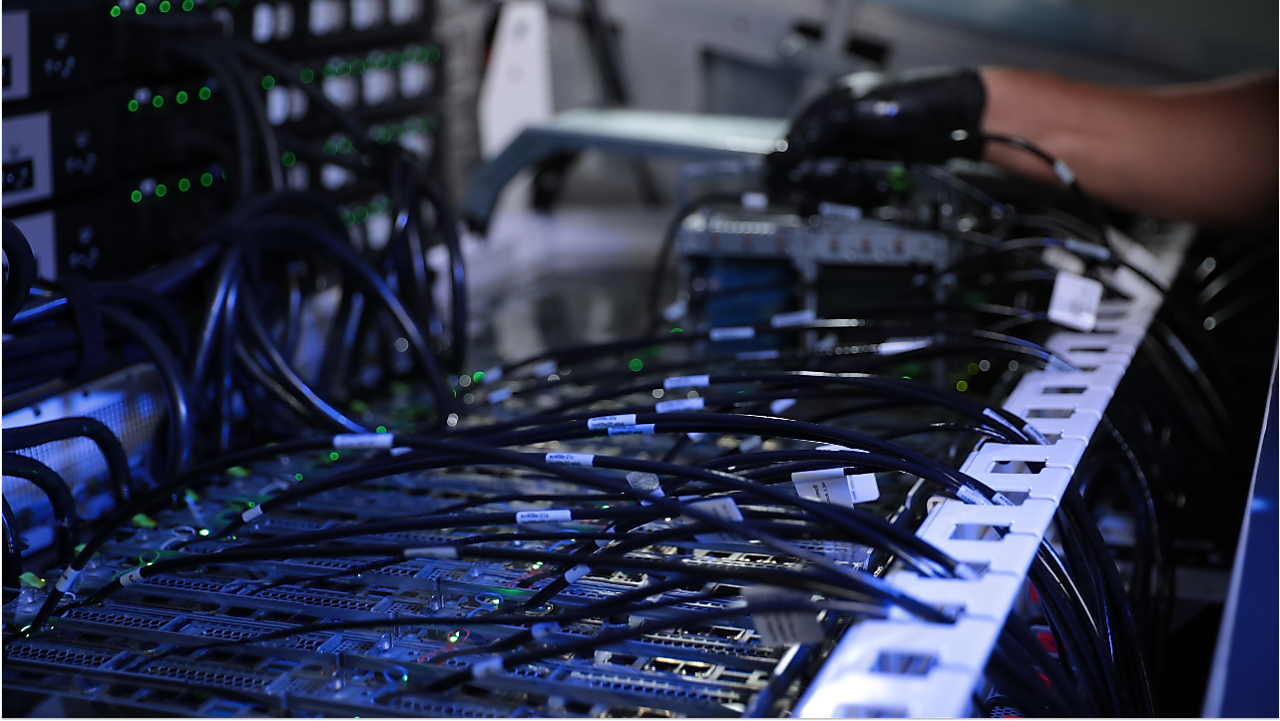
A really cool tech story
How innovative cooling technology can significantly reduce energy demand in data centres, the fast-expanding computing power behind artificial intelligence.

On September 23, 2025
In a low-rise building near the River Elbe in an industrial part of Hamburg, Germany, a team of scientists is pioneering innovative approaches to a growing challenge: cooling data centres, the specialist servers, storage and other IT equipment that are vital to artificial intelligence − and today’s wider digital economy.
Challenging the reliance on traditional systems like chillers, fans, and air conditioning to keep this kind of hardware cool, the team at Shell’s Technology Centre in Hamburg have developed advanced immersion cooling fluids – special liquids that absorb and dissipate heat – to efficiently manage the significant heat generated by densely packed computer systems.
And with good reason. “Our fluids can reduce energy use in data centres by nearly 50% compared to traditional cooling systems,” says Volker Null, Technology Manager for Thermal and Specialty Fluids at Shell, and one of the scientists in Hamburg. “This is a game changer at a time when artificial intelligence is driving an unprecedented surge in computing demand and, with it, the energy consumption of data centres.”
The numbers are striking: today, data centres consume 1.5% of global electricity according to the International Energy Agency (IEA). But with the rapid rise of artificial intelligence – powering everything from online shopping to medical breakthroughs – energy demand from data centres could more than double over the next five years, according to the IEA. By 2030, their energy consumption could rival that of Japan today.
Less energy, lower costs, smaller footprint
Immersion cooling works by submerging data centre equipment in specially engineered fluids with extremely low electrical conductivity. This can be more than 1,000 times more efficient than traditional air cooling − comparable to a marathon runner diving into a cold pool to cool down rather than standing in front of a fan. By requiring less energy, immersion cooling can also lower costs. “Switching to immersion cooling can reduce data centre operating expenses by up to one third,” says Cameron Cross, Business Development Manager for Shell’s global cooling fluids business out of Houston, USA. “With a reduced need for bulky chillers, fans or evaporative cooling systems, this approach can also significantly shrink the physical footprint of data centres.”
“Our fluids represent the culmination of nearly 50 years of Shell’s expertise in gas-to-liquids (GTL) technology,” says Volker, a chemist who joined Shell more than three decades ago. Shell’s GTL technology converts natural gas into synthetic fuels and lubricating base oils free from the impurities – such as sulphur and heavy metals – typically found in crude oil. This purity makes GTL-based immersion cooling fluids more effective at transferring heat and reduces the risk of damage to sensitive computer hardware.
“We continually test the purity and consistency of our GTL-based fluids to ensure they dissipate heat in a constant way and are stable when used in data centres,” says JanElsa Carty, Senior Project Leader in Thermal Fluids at Shell’s Technology Center in Houston. “This means that we can provide a high level of assurance to data centre operators that our fluids can be used safely and effectively.”
Photo gallery





Industry first
That reliability is gaining recognition. In May, Shell’s immersion cooling fluids became the first to receive official certification from a major chip manufacturer following two years of rigorous testing by US company Intel.
Since then, Shell’s team has launched a solution designed to cool the most heat-intensive components in data centres, such as central processing units and graphics processing units. The new product is designed for direct liquid cooling, or direct-to-chip cooling; rather than submerging components in cooling fluids, a cold plate placed on the components allows the fluid to pass directly next to the heat source. “This can reduce the energy use of the most heat-intensive components by up to 27% compared to traditional air cooling,” says Volker.
Shell has also used its immersion cooling expertise to create high-performance thermal management fluids for electric vehicle batteries. These support the trend toward smaller and lighter batteries, helping to pave the way for electric vehicle charging in under 10 minutes.
Helping to reduce Shell’s own energy use
The cooling products are not just for customers. Shell has been using its immersion cooling fluids in its own IT operations since 2022. “We most recently deployed the fluids in our high-performance computing cluster in Bangalore in India,” says Sujith Nair, Innovation Programme Manager at Shell. “The fluids significantly boost the energy efficiency of the cluster, which is critical in supporting large-scale artificial intelligence computing for Shell’s global research and development hubs in Amsterdam, Bangalore, Houston, and London.”
“Immersion cooling is still an emerging technology,” says Cameron. “But with the growing demand for high-performance computing, advanced technologies such as immersion cooling fluids will be critical.”
Cautionary note
Cautionary note
The companies in which Shell plc directly and indirectly owns investments are separate legal entities. In this content “Shell”, “Shell Group” and “Group” are sometimes used for convenience to reference Shell plc and its subsidiaries in general. Likewise, the words “we”, “us” and “our” are also used to refer to Shell plc and its subsidiaries in general or to those who work for them. These terms are also used where no useful purpose is served by identifying the particular entity or entities. ‘‘Subsidiaries’’, “Shell subsidiaries” and “Shell companies” as used in this content refer to entities over which Shell plc either directly or indirectly has control. The terms “joint venture”, “joint operations”, “joint arrangements”, and “associates” may also be used to refer to a commercial arrangement in which Shell has a direct or indirect ownership interest with one or more parties. The term “Shell interest” is used for convenience to indicate the direct and/or indirect ownership interest held by Shell in an entity or unincorporated joint arrangement, after exclusion of all third-party interest.
Forward-Looking statements
This content contains forward-looking statements (within the meaning of the U.S. Private Securities Litigation Reform Act of 1995) concerning the financial condition, results of operations and businesses of Shell. All statements other than statements of historical fact are, or may be deemed to be, forward-looking statements. Forward-looking statements are statements of future expectations that are based on management’s current expectations and assumptions and involve known and unknown risks and uncertainties that could cause actual results, performance or events to differ materially from those expressed or implied in these statements. Forward-looking statements include, among other things, statements concerning the potential exposure of Shell to market risks and statements expressing management’s expectations, beliefs, estimates, forecasts, projections and assumptions. These forward-looking statements are identified by their use of terms and phrases such as “aim”; “ambition”; ‘‘anticipate’’; “aspire”, “aspiration”, ‘‘believe’’; “commit”; “commitment”; ‘‘could’’; “desire”; ‘‘estimate’’; ‘‘expect’’; ‘‘goals’’; ‘‘intend’’; ‘‘may’’; “milestones”; ‘‘objectives’’; ‘‘outlook’’; ‘‘plan’’; ‘‘probably’’; ‘‘project’’; ‘‘risks’’; “schedule”; ‘‘seek’’; ‘‘should’’; ‘‘target’’; “vision”; ‘‘will’’; “would” and similar terms and phrases. There are a number of factors that could affect the future operations of Shell and could cause those results to differ materially from those expressed in the forward-looking statements included in this content, including (without limitation): (a) price fluctuations in crude oil and natural gas; (b) changes in demand for Shell’s products; (c) currency fluctuations; (d) drilling and production results; (e) reserves estimates; (f) loss of market share and industry competition; (g) environmental and physical risks, including climate change; (h) risks associated with the identification of suitable potential acquisition properties and targets, and successful negotiation and completion of such transactions; (i) the risk of doing business in developing countries and countries subject to international sanctions; (j) legislative, judicial, fiscal and regulatory developments including tariffs and regulatory measures addressing climate change; (k) economic and financial market conditions in various countries and regions; (l) political risks, including the risks of expropriation and renegotiation of the terms of contracts with governmental entities, delays or advancements in the approval of projects and delays in the reimbursement for shared costs; (m) risks associated with the impact of pandemics, regional conflicts, such as the Russia-Ukraine war and the conflict in the Middle East, and a significant cyber security, data privacy or IT incident; (n) the pace of the energy transition; and (o) changes in trading conditions. No assurance is provided that future dividend payments will match or exceed previous dividend payments. All forward-looking statements contained in this content are expressly qualified in their entirety by the cautionary statements contained or referred to in this section. Readers should not place undue reliance on forward-looking statements. Additional risk factors that may affect future results are contained in Shell plc’s Form 20-F and amendment thereto for the year ended December 31, 2024 (available at www.shell.com/investors/news-and-filings/sec-filings.html and www.sec.gov). These risk factors also expressly qualify all forward-looking statements contained in this content and should be considered by the reader. Each forward-looking statement speaks only as of the date of this content. Neither Shell plc nor any of its subsidiaries undertake any obligation to publicly update or revise any forward-looking statement as a result of new information, future events or other information. In light of these risks, results could differ materially from those stated, implied or inferred from the forward-looking statements contained in this content.
Shell’s net carbon intensity
Also, in this conent we may refer to Shell’s “net carbon intensity” (NCI), which includes Shell’s carbon emissions from the production of our energy products, our suppliers’ carbon emissions in supplying energy for that production and our customers’ carbon emissions associated with their use of the energy products we sell. Shell’s NCI also includes the emissions associated with the production and use of energy products produced by others which Shell purchases for resale. Shell only controls its own emissions. The use of the terms Shell’s “net carbon intensity” or NCI is for convenience only and not intended to suggest these emissions are those of Shell plc or its subsidiaries.
Shell’s net-zero emissions target
Shell’s operating plan and outlook are forecasted for a three-year period and ten-year period, respectively, and are updated every year. They reflect the current economic environment and what we can reasonably expect to see over the next three and ten years. Accordingly, the outlook reflects our Scope 1, Scope 2 and NCI targets over the next ten years. However, Shell’s operating plan and outlook cannot reflect our 2050 net-zero emissions target, as this target is outside our planning period. Such future operating plans and outlooks could include changes to our portfolio, efficiency improvements and the use of carbon capture and storage and carbon credits. In the future, as society moves towards net-zero emissions, we expect Shell’s operating plans and outlooks to reflect this movement. However, if society is not net zero in 2050, as of today, there would be significant risk that Shell may not meet this target.
Forward-Looking non-GAAP measures
This content may contain certain forward-looking non-GAAP measures such as adjusted earnings and divestments. We are unable to provide a reconciliation of these forward-looking non-GAAP measures to the most comparable GAAP financial measures because certain information needed to reconcile those non-GAAP measures to the most comparable GAAP financial measures is dependent on future events some of which are outside the control of Shell, such as oil and gas prices, interest rates and exchange rates. Moreover, estimating such GAAP measures with the required precision necessary to provide a meaningful reconciliation is extremely difficult and could not be accomplished without unreasonable effort. Non-GAAP measures in respect of future periods which cannot be reconciled to the most comparable GAAP financial measure are calculated in a manner which is consistent with the accounting policies applied in Shell plc’s consolidated financial statements.
The contents of websites referred to in this content do not form part of this content.
We may have used certain terms, such as resources, in this content that the United States Securities and Exchange Commission (SEC) strictly prohibits us from including in our filings with the SEC. Investors are urged to consider closely the disclosure in our Form 20-F and any amendment thereto, File No 1-32575, available on the SEC website www.sec.gov.


